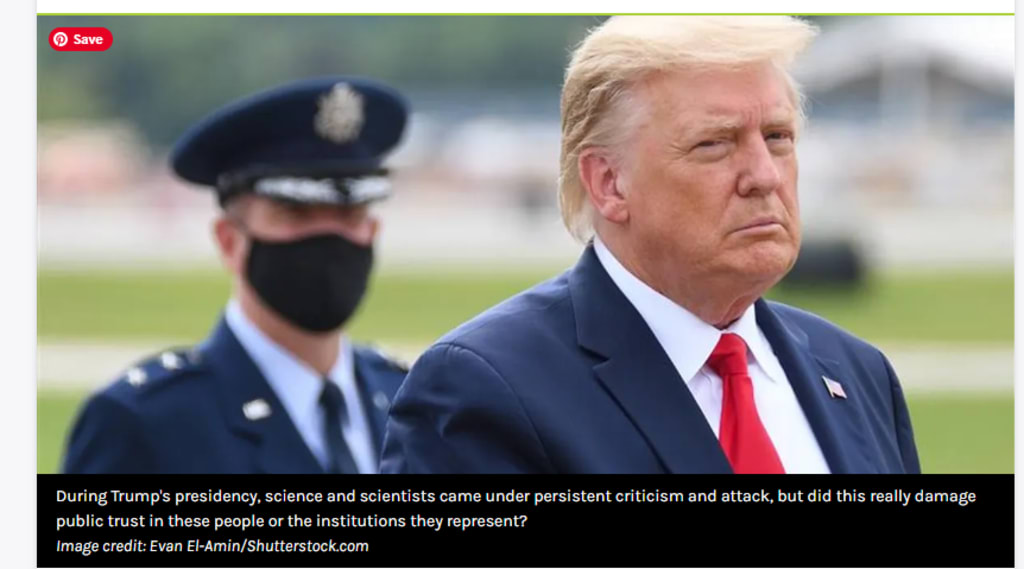The intended outcome of Trump's attacks on science throughout his presidency was not achieved.
Since 2016, there has been a little increase in mistrust in scientific knowledge and science itself, but this has been more than offset by a larger increase in general trust across political spectrums.

Individual citizens require access to trustworthy and dependable information to make educated decisions. This is the reason that press and information freedoms are crucial to a healthy democracy. Citizens are believed to have gained unprecedented levels of empowerment with the advent of the internet, enabling them to more or less obtain real-time information on matters that are important to them.
But in the so-called "post-truth" era, this idea of "public trust" has taken center stage for a lot of individuals and organizations. Political discourse appears to be dominated by accusations of prejudice, conspiratorial deception, and the spread of "fake news," particularly in the wake of the COVID-19 outbreak.
The public's confidence in American scientific and health institutions, such as the Centres for Disease Control and Prevention (CDC) and Anthony Fauci, the former director of the National Institute of Allergy and Infectious Disease at the National Institutes of Health, has been continuously targeted and undermined by Donald Trump and his administration throughout his presidency.
But did the public mistrust this persistent resistance to science as much as is generally thought? Well, maybe not.
In a recent study, Jon D. Miller and colleagues at the University of Michigan's International Centre for the Advancement of Scientific Literacy examined three issues about comprehending public attitudes towards science in the US. The first two dealt with the question of whether the views of the public should be viewed as single or multidimensional, as well as the variables that influence or forecast the attitudes of citizens.
The final query then looked at whether the public's perceptions of science and technology were altered by Trump's constant attacks on the scientific community.
The researchers looked at information gathered from nationwide probability surveys of US adults conducted over the previous 60 years to answer these issues. But when it came to the third question, they focused especially on the answers provided by fewer than 3,000 US participants in late 2020—almost a year after the pandemic—and early 2016—right before Trump's election.
According to the statistics, over this time, the proportion of people who did not have a strong opinion on whether or not they believed information from scientists or scientific institutions fell sharply, from roughly 76 percent to just 29 percent. These once "neutral" parties don't seem to have moved in the same proportion to either extreme of the trust spectrum.
In those years, the proportion of participants who reported poor (2%) or very low (1%) faith in science and its experts increased to 9 and 6 percent, respectively, while the proportion who expressed strong or very high faith in science increased from 23 to 43 percent.
These changes happened in all political circles. Despite expectations to the contrary, the opinions of conservative Republicans were divided, with a roughly 21-point increase in those expressing high and very high trust (to 37 percent) and a nearly 20-point spike in very low and low trust (to 24 percent).
There has been a significant shift in favor of more trust among Liberal Democrats over this period. Just 42% of respondents in 2016 said they had a high or very high level of trust in science; by the end of 2020, as Trump's term was concluding that number had increased to over 87%. The percentage of respondents who said they had very little or no trust increased very slightly, from 2 to 3 percent.
According to Miller and colleagues, "President Trump and his administration's attacks on science and denial of climate change as a serious issue were unprecedented in the postwar era, and numerous members of the scientific community expressed concern that [trust] between the scientific community and the public was deteriorating."
According to the findings of our study, citizens are generally optimistic about the potential benefits of scientific and technical advancements and are only mildly concerned about potential negative effects. We think that in a democracy, there should be a healthy balance between high hopes and minimal worry.
As they put it, "A level of very high concern would be limiting and harmful to science, and an absence of any concern would be unrealistic."
Overall, the data suggests that throughout the Trump presidency, there was a modest rise in the number of people expressing confidence in science and scientific knowledge. These findings, according to Miller and his colleagues, support their previous studies on expert trust during the COVID-19 epidemic. In several surveys from 2022, it was discovered that moderate and independent voters' support for President Biden in 2020 was greatly influenced by their faith in scientific knowledge.
"To put it briefly, American people have supported science and technology for the past 60 years, and the Trump administration did not undercut this support."






Comments
There are no comments for this story
Be the first to respond and start the conversation.